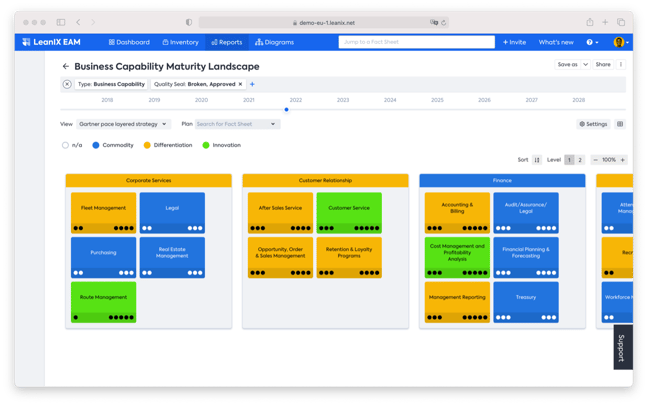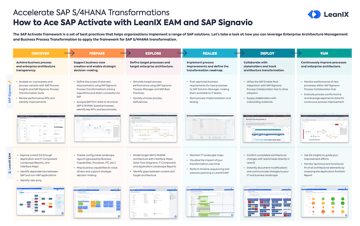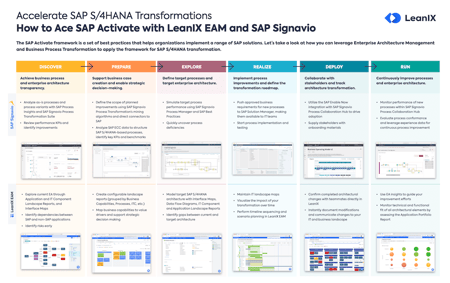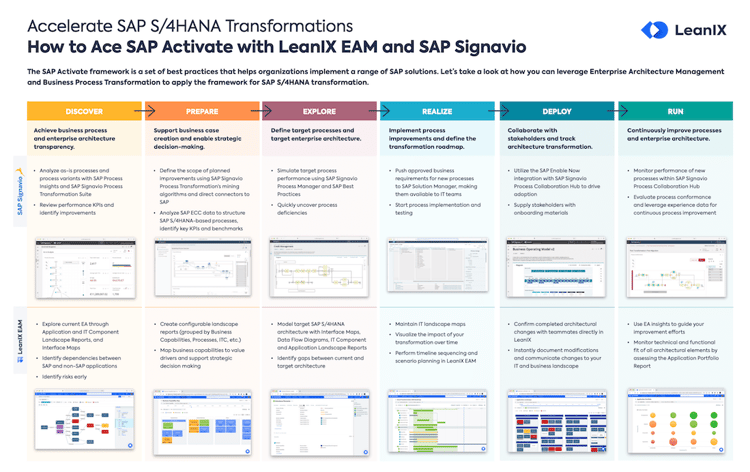Create landscape reports with LeanIX EAM
While Business Process Transformation tools (Signavio) deal with an organization’s process landscape, EAM tools provide architects with a holistic overview of the IT landscape.
Based on the findings made during the Discovery phase, teams are now able to create configurable landscape reports. These reports help facilitate project planning and play a crucial role in mapping business capabilities to value drivers.
Landscape reports depict IT landscapes at specific points in time or within a given timeframe. They can be grouped according to Business Capabilities, Processes, Consumed/Provided Interfaces, IT Components, and a wide range of other technical and functional requirements.
Using the report views, users can create color-coded heat maps of their IT landscapes. This helps users visualize their S/4HANA project in a proper way and get actionable insights. Landscape reports are easy to update and edit. The edit pane in the report view lets users quickly edit tags, attributes, and relations to LeanIX Fact Sheets.

Project managers can then use the landscape reports, to map business capabilities throughout the organization.
Map business capabilities with LeanIX EAM
Based on the findings in the Discover phase and landscape reports, teams will now be able to map business capabilities to value drivers.
The LeanIX EAM provides enterprise architects and S/4HANA project managers with business capability modeling. A technique for the representation of an organization’s business anchor model. This is independent of the structure, processes, people, or domains.
Business capability models enable the discussion of strategic decision-making and can serve as the structuring element to uncover potential IT redundancies.
The EAM tool offers pace-layered overviews of business capabilities. Pace-layered views help teams look at the application landscape in terms of the relationship between business capabilities and strategic objectives.
Based on business capability maps, architects can align corporate objectives with both SAP and non-SAP IT initiatives, and build or refine transformation items. Business capability maps encapsulate what a business is doing right now and what needs to be done to meet current and future challenges. They provide a clear link from strategy to execution. It is a vital activity in the SAP project timeline.
Finalize a high-level project timeline
Using all the information gathered during the Prepare phase, SAP teams can finalize the project plan and timeline for the S/4HANA transformation. During this activity, roles and responsibilities are completed along with the identification of project team members, governance procedure, and escalation matrix.
The finalized plan will include specific activities and key goals which will guide the SAP project. These include:
- Project Management Plan: Plan the appropriate management strategies and engage stakeholders.
- Scope statement: The project scope statement evolves during the planning of the project and explicitly defines the deliverables of the S/4HANA project plan.
- WBS: Create the work breakdown structure (WBS) for the project. It is vital for the organization and coordination of the project.
- Project schedule: The project schedule defines the work to be performed, resources, associated time commitments, and the individual phases of the project.
- Plan budget/risk/communication: The budget baseline will be finalized and the project risks are identified and assessed. A communication management plan is defined which outlines the communication requirements for the project.
- Plan procurement: Prepare the guidelines for all procurement activities, including materials, products, or services identified for outside procurement.
The goal is to finalize a high-level project plan based on the business capability map and other data gathered during
SAP Discover and Prepare phases.
Conclusion
The SAP Prepare phase sets the stage for the upcoming Explore phase – arguably one of the most important steps in the SAP Activate methodology. SAP provides plenty of internal tools such as assessments, roadmaps, and templates (RICEFW) to make the transformation to S/4HANA a more straightforward and structured process.
They also endorse third-party apps such as the LeanIX EAM to supplement migration efforts. Using the EAM on its own or in tandem with SAP Signavio, the tool helps alleviate the complexity inherent to IT landscapes.
The LeanIX EAM is the only EA solution to be part of SAP's “Endorsed App” catalog.


/EN-S4Hana-Roadmap-Poster_Resource_Page_Thumbnail.png?width=400&height=280&name=EN-S4Hana-Roadmap-Poster_Resource_Page_Thumbnail.png)
/EN/Reports/EN-LX-SAPS4HANA-Survey-Resource-Page-Thumbnail.png?width=260&height=171&name=EN-LX-SAPS4HANA-Survey-Resource-Page-Thumbnail.png)
/EN/White-Paper/EN-SAP-Getting-it-Right-WP-Page-Thumbnail.png?width=260&height=171&name=EN-SAP-Getting-it-Right-WP-Page-Thumbnail.png)
/EN/Video/Webinar-Thumbnail-360x250@2x-2.png?width=260&height=171&name=Webinar-Thumbnail-360x250@2x-2.png)
/EN-WP-SAP-S4Hana-Migration-Resource_Page_Thumbnail.png?width=260&height=171&name=EN-WP-SAP-S4Hana-Migration-Resource_Page_Thumbnail.png)

